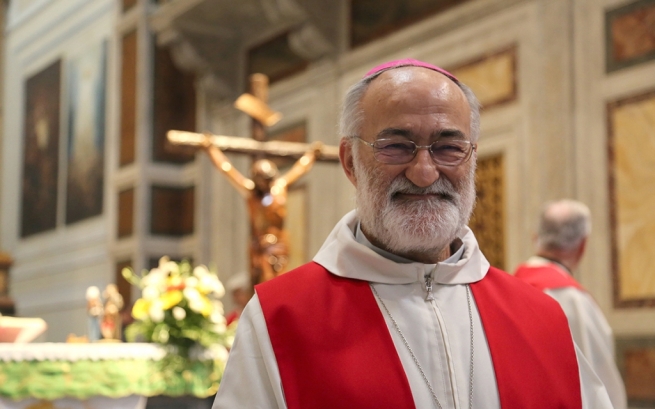Do you prefer to be presented as a cardinal or as a Salesian?
Being a Salesian is my Christian identity… For me, being a cardinal adds nothing to who I am; for me, it is essential to be a Christian and a Salesian.
You say that being a cardinal is not a promotion. How do you understand it then?
It is a service that I am asked to render to the universal Church. All the rest, being a bishop, being a cardinal, is a consequence of my baptismal vocation. The fundamental thing is baptism which makes us children of God and brothers of Jesus and of all humanity, this is the highest honor, our fundamental vocation. All the rest are services.
Don Bosco, the founder of the Salesians, had revelatory dreams. How do you dream the Church?
Pope Francis in the document "Querida Amazonia" ends in a chapter talking about four dreams. A social dream, a cultural dream, an ecological dream, and an ecclesial dream. Here he speaks of a synodal, communal Church, in which we move forward together; a Church people of God, in communion. As the Pope once said, "how I would like a Church that is poor for the poor"; an outgoing Church, as he often repeats, that goes out and puts itself at the service of the world to build society according to the criteria of the Gospel; a Church that goes out to those who are wounded. Such a Church is the one I dream of, and in this dream, I fully agree with the expressions of Pope Francis and with what I understand as Gospel.
You are a cardinal in Rabat, Morocco, a country where Christians are a minority. What is the Church doing in Morocco?
I was converted here. Not now, but also when I was in Kenitra for eight years. I came from a completely different situation in Christianity in Paraguay, where 99% of the people were baptized. Now I find myself in a place where Christians are an absolute minority, where we have no social clout. One wonders what we are doing here, what is the significance of the Church's presence here. A commercial company would have gone away after so many years without making a "profit". We stay because we believe we are here because God calls us to be here, and then we discover what I hope the whole Church discovers: the end is the Kingdom of God, not the Church. We are not here to enlarge the Church; we are here to proclaim Christ and the Gospel. And we do this through our personal witness, our work to build a better world and to make humanity, increasingly more, the family of God, united and in fraternity. We live our Christian faith with joy here in the minority.
Does inter-religious dialogue start day by day rather than, say, top-down?
Islamic-Christian dialogue is lived first and foremost in coexistence, in daily life, in friendship, in good neighborliness, in work. I highly recommend a motto that says "talk less about Muslims and talk more with Muslims." When you talk to a Muslim and ask him about his concerns, how he lives, what are the things that distress him, you realize that he is like us. That's what interfaith dialogue is all about, and it's done almost unwillingly – it comes naturally. Then there is the dialogue of works, working together for human rights, for the great causes of humanity. Here, too, we can have joint projects.
Where should the Church be today?
Wherever the human person is, especially the poorest and most abandoned. The Church, which is not only the bishops, must be where there is pain. Christians must be like the blood that goes to the wound without being called. When the blood gushes from the wound, it is not that it wants to escape; it wants to close the wound with platelets. A Christian should be where there is a wound in the world, trying to heal that wound. One should be everywhere, but especially where there is a wound.


